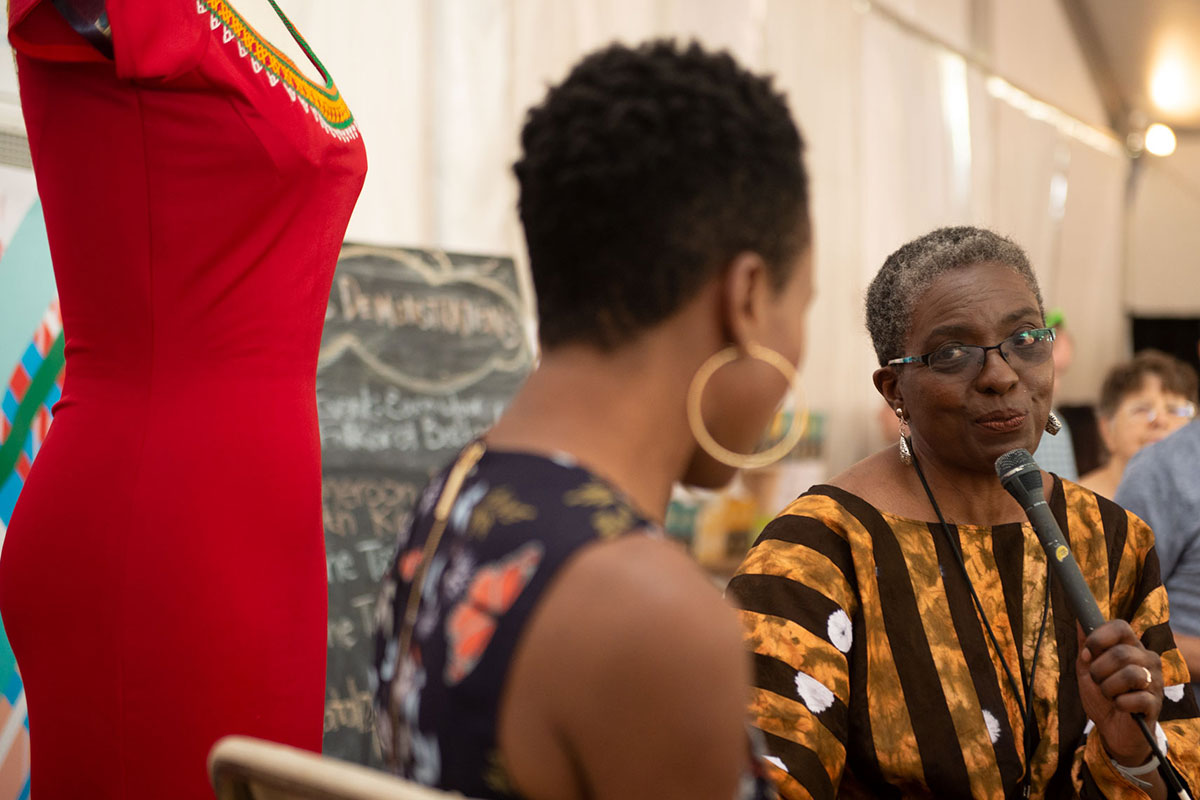The Center for Folklife and Cultural Heritage is pleased to announce two new virtual internship positions as part of the African American Craft Initiative (AACI) and the Crafts of African Fashion (CAF) project. Beginning this winter, the internships will run from January to April 2022 and are part-time.
Working under the supervision and mentorship of curator Diana N’Diaye and project coordinator Sloane Keller, interns will have the opportunity to listen and learn from experiences of African and African American artists and artisans in their own words and participate in activities to amplify these powerful legacies for generations to come. The primary assignment will involve working as part of the initiative team, conducting research, and helping to coordinate programming activities. The interns will also learn about the Crafts of African Fashion project and assist with the development of funding proposals and programmatic activities. Selected applicants will receive a stipend of $1,500. Read the full internship description.
“The AACI curatorial internship provided invaluable exposure and insight into the rich cultural traditions and community within African American craft,” said Mya Lewis, an intern with the program in 2020. “This internship supported my research interests in making empowering connections not frequently included in the traditional, art historical narratives on craft, design, and art.”
Over the years, the Smithsonian Folklife Festival has presented and documented hundreds of African and African American makers. These images, video files, and first-person narratives provide a rich source of documentation in the Ralph Rinzler Folklife Archives and Collections. Through their work with AACI and CAF, the interns will continue to add to these collections, effectively amplifying underrepresented voices from past and present programs. This work will include adding research and oral histories of makers to the AACI database, writing articles for Folklife Magazine, producing virtual programming like Story Circles, circulating a monthly makers bulletin, and hosting virtual convenings.
“As a young African American woman, the internships I had at the beginning of my career were my introduction to the museum world,” said curator Diana N'Diaye. “After many decades of work in this field, I think that there is still a crucial need to create opportunities for a more diverse pool of interns to enter the field.”
To apply for the internship online, visit solaa.si.edu and create an account. After selecting internship, specify the Center for Folklife and Cultural Heritage and indicate AACI/CAF internship on the application. The submission deadline has been extended to December 31. If you have questions, please contact intern coordinator Arlene Reiniger at ReinigerA@si.edu.
The AACI-CAF internship adds to the work of the Center to uplift the voices of young women of color, an underrepresented population at the Smithsonian. For interested candidates in the fields of folklore, archival work, and cultural heritage, we encourage you to also explore the Center’s Mentorship Program for a More Diverse Workplace.
About the Cultural Sustainability Program
The Center for Folklife and Cultural Heritage’s Cultural Sustainability program works with communities to bolster efforts to preserve and practice living cultural heritage in the face of social, economic, and political challenges. Through its work, the program works to understand and mitigate threats to cultural sustainability, scale our impact through partnerships, convenings, and thought leadership, and transform public understanding about cultural diversity.
About the African American Craft Initiative
The African American Craft Initiative aims to expand the visibility of African American artists and makers by highlighting the importance of their practices as essential to community economic and social health. Critically, the initiative aims to broaden the understanding of contemporary craft in the United States and demonstrate African American craft’s contribution to cultural heritage. Through collaborative research, documentation, and public programming, AACI aims to improve and increase documentation of African American makers and their craft; develop and renew networks of support within the craft community; and increase public awareness of African American craft. These efforts will contribute to the continuity of these vital arts, adapted to local settings in ways that consider new environmental, social, and cultural factors.
About Crafts of African Fashion
Crafts of African Fashion supports African artisans, designers, and other stakeholders in the cultural industries sector to sustain heritage craft. CAF launched at the 2018 Smithsonian Folklife Festival Marketplace in partnership with the National Museum of African Art and the National Museum of African American History and Culture. The success of the launch signals a supportive cultural sector that can nurture diverse and distinct local African fashion design identities while at the same time developing sustainable local artisan enterprise. Working with local partners across Africa, CAF brings together artisans, designers, museums, scholars, educators, government officials, craft organizations, training centers, cultural tourism, and other stakeholders for collective activities to sustain heritage craft through increasing knowledge and awareness of artisans’ work and their contributions to fashion.


